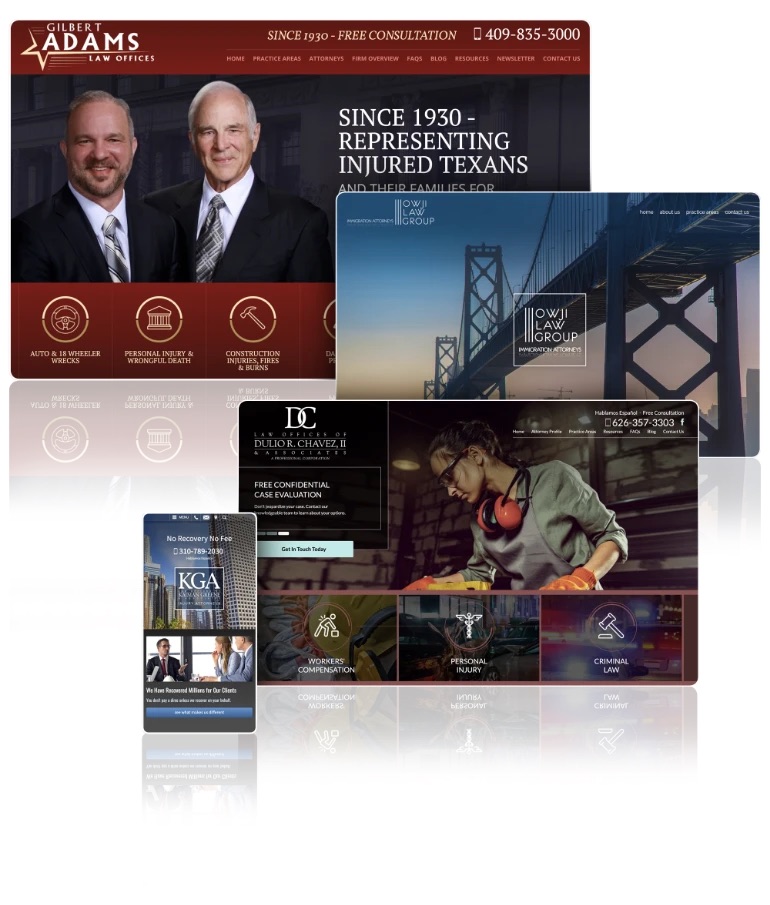Custom Website Designs vs. Template-Based Solutions for Law Firms

In today’s competitive legal market, a law firm’s website serves as its virtual office, most fundamental marketing platform, and brand promotion. It’s the first point of contact for many potential clients and a platform to showcase the law firm’s experience, professionalism, and ability to handle a potential client’s legal situation.
With such high stakes, the question arises: Should law firms invest in custom website designs or opt for template-based solutions?
NextClient, a leader in law firm website design for more than 20 years, emphasizes the importance of building a website from the ground up to the exacting specifications of the law firm while maintaining cutting-edge, best practices standards. But how crucial is it really? Let’s explore.
The Case for Custom Attorney Website Designs
1. Unique Branding: A custom website allows law firms to incorporate unique branding elements, such as firm logos, color schemes, and imagery, creating a cohesive and memorable brand image that sets the firm apart from competitors.
2. Tailored User Experience: Custom legal website designs enable law firms to create a user experience tailored to their target audience. Whether it’s simplified navigation for personal injury victims or a resource-rich interface for corporate clients, customization allows for a more compelling user journey built for conversion and retention.
3. SEO Advantages: Custom-built websites are generally more SEO-friendly. They allow for better optimization of elements like meta descriptions, URLs, and image alt texts, which can significantly improve search engine rankings.
4. Scalability: As the law firm grows, a custom website can easily be scaled to include additional pages, features, or even other languages without the constraints of a template.
5. Security: Custom websites are often more secure because they are built from the ground up with security measures tailored to the law firm’s specific needs.
The Case for Legal Template-Based Solutions
1. Cost-Effectiveness: Templates are generally less expensive upfront and can be attractive for small law firms or solo practitioners on a tight budget.
2. Speed: Template-based websites can be up and running in a matter of days, whereas custom designs may take weeks or even months to develop.
3. Ease of Use: Many templates come with drag-and-drop features, making it easy for someone without technical skills to manage the website.
4. Standard Features: Templates often come with built-in features like contact forms, galleries, and blogs, which can be useful for law firms that require basic functionalities.
The Verdict
While template-based solutions offer speed and cost-effectiveness, they often fall short of creating a unique and impactful online presence. Law firms are not generic businesses; they offer specialized services that require a tailored approach to online marketing. A custom website design provides the flexibility, branding, and user experience that can make a significant difference in how a law firm is perceived online.
Moreover, for attorneys and law firms, trust is important. A custom website, built with attention to detail and a focus on the user experience sends a strong message of professionalism and competence. It shows potential clients that the firm is willing to invest in providing high-quality services, starting with their online presence.
In the competitive landscape of legal services, standing out is not just an advantage—it’s a necessity. Custom website designs offer law firms the opportunity to differentiate themselves, tailor the user experience, and, ultimately, build a stronger brand. While template-based solutions may seem like a quick fix, they often result in a generic online presence that fails to capture the unique value a law firm brings to its clients.
Investing in a custom website design is not just about aesthetics; it’s about creating a strategic asset that can drive business growth. NextClient emphasizes that customization is the better option for law firms looking to make a lasting impact, develop long-term retention, and maximize client conversion.
